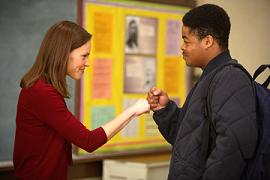 I liked “The Good Shepherd” and enjoyed Ellen Leventry’s Idol Chatter review of it, with one main point of disagreement. Where she saw it as perhaps an incomplete movie about the CIA, I thought it was a thorough–if not ingenious–look at the career path that cost many of our fathers (and grandfathers) the life they once dreamed of and the one their parents wished for them.
I liked “The Good Shepherd” and enjoyed Ellen Leventry’s Idol Chatter review of it, with one main point of disagreement. Where she saw it as perhaps an incomplete movie about the CIA, I thought it was a thorough–if not ingenious–look at the career path that cost many of our fathers (and grandfathers) the life they once dreamed of and the one their parents wished for them.
What Ellen saw as a “romantically sharp contrast” between Matt Damon’s character, Edward Wilson, in a flashback from his adult role to his college days was actually a dramatic and tragic contrast between what he could have become and what he did become. I agreed with her comment that “Wilson struggles with secrets… but is extremely good at keeping them,” but that’s more a story about Wilson’s entire generation and not just the CIA.
How many men became something they never intended, because of their sense of duty to either their family or their country? Who really dreamed of working 70 hours a week (or even a “9 to 5” job) but ended up taking just that sort of job and doing what was required of them? Wilson’s “jarring turn from young romantic to enigmatic adult” is typical of most men, not just CIA men, of that generation. What Ellen describes as a “patriotic zeal” that sacrificed “the health of his soul” is what way, way too many men from that generation experienced. It wasn’t just limited to the CIA.
By the time Wilson discovers his heart for his son and the pain of a distant relationship to his wife, it is too late to prevent the painful consequences that transpire later in life. It also leads him to make some unwise personal choices. Wow, doesn’t that sound familiar to many of us?
I hope every high school student can someday see a PG-rated version of “The Good Shepherd,” either in Social Science, Human Development, or some other class. It would help a lot of kids understand the pains (and sins) of their forefathers and prepare them to make healthier choices in their own futures. Edward Wilson always thought he was doing the right thing. Who of us doesn’t?


